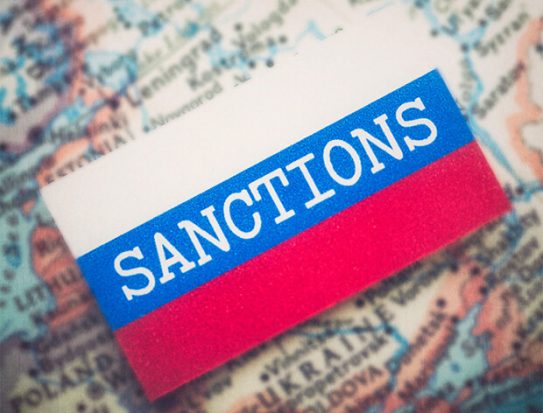On 24 February 2022, Russian President Vladimir Putin announced ‘special military action’ against its eastern neighbour Ukraine. The USA and the European Union vehemently criticised the move as unjustified, unprovoked act to invade Ukraine and imposed a series of tough sanctions against Russia both diplomatic and economic in nature. Along with human causalities a war also affects the economy of fighting nations as well as those who have any kind of economic transactions with them.
By Rahul Choudhury
As India has long standing economic ties with Russia, any sanction against it would affect the Indian economy both directly and indirectly. In this backdrop, this article aims to examine how the ongoing war between Russia and Ukraine would influence the Indian economy.
Economic Sanctions Imposed so far
To isolate Russia and penalise its economy, the US and the EU immediately announced a large set of sanctions after it launched military action against Ukraine. As of now, the economic sanctions imposed on Russia are in two distinct forms. First, it imposed ban on the buying and selling of Russian goods and services. Second, was excluding Russia from accessing the global financial system.
The EU and the USA decided to prohibit select Russian banks from accessing the Society for Worldwide Interbank Financial Telecommunications (SWIFT) system. SWIFT is a vast messaging network used by banks and other financial institutions to communicate safely and securely. Delisting its banks from SWIFT network would make it difficult for Russia to export its goods and services.
The United States (US) and its allies, the European Union (EU), New Zealand, Japan and Singapore have imposed sanctions on Russia’s central bank and sovereign wealth funds, apparently freezing their assets invested outside. Going a step ahead, G7 and EU countries have frozen the foreign exchange and gold reserves in their territories held by Russian institutions. It paralyses about 50 percent of Russian central bank’s $630 billion worth of foreign currency and gold reserves. Their sanction also targeted at Russia’s oil fields and military exports.
The EU and a few other nations have closed the airspace for all Russian-owned, Russian registered or Russian-controlled aircraft. The EU also banned the state-owned Russian media outlets Russia Today and Sputnik, as well as their subsidiaries.
Together, these sanctions imposed against Russia would involve unprecedented diplomatic and economic costs pave the way to further isolate it from the global financial system and international community.
Impact on Indian Economy
The escalating geo-political tussle between Russia and Ukraine will have potential impact on Indian economy as Russia and Ukraine supply significant volume of critical items such as defence goods, crude oil, sunflower oil, fertilisers and several other minerals. Russia has been a strategically important military partner for India, primarily because India sources a substantial portion of its military hardware and technology from Russia.
Russia has been India’s defence partner for a long time and India imports majority of its defence supplies from Russia. The Stockholm International Peace Research Institute (SIPRI) data suggest India imported around 50 percent of arms from Russia during the period between 2016 and 2020. Very recently in December 2021 during the visit of Russian President India signed 28 different agreements with Russia. The agreement includes production of Russian assault rifles for the Indian Army. Back in 2018, India agreed to buy S-400 surface-to-air missile and also received the first consignment last year. The deal for joint production of 200 Kamov 226T light helicopters between these two nations is also underway. All these activities are vulnerable to the US sanction under its Countering America’s Adversaries Through Sanctions Act (CAATSA). It is likely that the US sanction would affect India’s arms import from Russia.
Bilateral trade between India and Russia amounted to USD 11.9 billion in 2021. India exported goods worth USD 3.3 billion, which primarily consist of pharmaceutical products worth USD 542 million. In addition, India exported other items such as iron and steel, gems and jewelry electronics goods, tea and vehicle parts to Russia in significant volume. Imports from Russia stood at USD 8.6 billion during 2021, which includes crude oil, petroleum products, gold, precious stones and metals, coal and fertilisers. Any unrest in a market like Russia would severely hit the Indian exporters who are already struggling with low demands due to global outbreak of Covid 19.
To diversify its coking coal imports, India and Russia signed a MoU in October 2021 for mining and steel, with a focus on coking coal. The expanding sanctions on Russia, will possibly lead to roadblocks for these supplies. Importantly, together Russia and Ukraine meet around 90% of India’s total sunflower oil demand and any disruption in supply will severely impact the cooking oil prices in the Indian market.
India’s bilateral trade with Ukraine in 2021, reached at USD 3.1 billion. India exported items worth USD 510 million. Pharmaceutical products made up for most of India’s export basket at 32%, while other items shipped to Ukraine were agro-chemicals, iron and steel, telecom instruments and coffee. India’s imports from Ukraine was valued USD 2.6 billion in 2021, of which USD 1.85 billion primarily comprised sunflower oil.
Procuring these items from other sources will lead to higher costs and inflationary pressure on the Indian economy and expand the current account deficit. The supply chain disruption will affect the Indian exporters as they export several items to both the economies.
Along with trade, India also has huge investment interest in Russia. India’s state-owned energy firms have huge made investments in Russian oil and gas blocks. Indian companies such as Indian Oil Corporation (IOC), Oil India Ltd (OIL), ONGC Videsh Ltd (OVL), and Bharat Petro Resources Ltd (BPRL) are estimated to have invested about USD 13.6 billion in Russian oil and gas projects. Stock prices of these companies listed in National Stock Exchange registered a sharp decline since the war started.
In case of financial sanctions, India’s central bank has not issued any directive yet regarding transaction with Russian Banks. However, news agency Reuters reported that one of India’s largest banks, the State Bank of India (SBI) has decided to stop processing any transactions involving Russian financial entities as a response to the international sanctions imposed on them. Interestingly, India could evade the sanctions on Russian financial institution on dollar trade by expanding its existing rupee-rouble trade pact. The two nations had also agreed to carry out India’s payments for defence trade. It could be expanded to trading other items as well. This trade agreement could be used to route payments by other entities to Russian businesses. Notably, earlier also India has used similar tactics to bypass the US sanctions imposed on Iran for importing oil. But, how much this idea influences the Indian law makers now remains to be seen. Defying the sanction imposed by western countries would annoy them and may risk India’s own access to their market. Hence, India would undoubtedly adopt a balanced approach.
This article first appeared in www.vifindia.org and it belongs to them.








